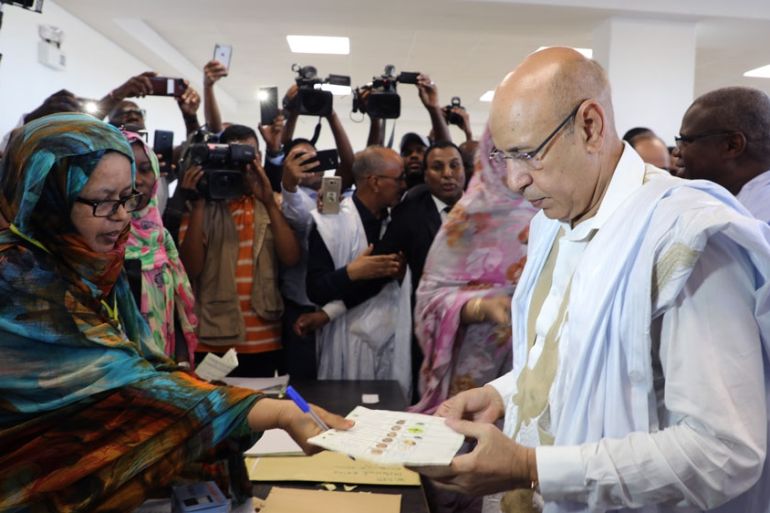Mauritania’s Ghazouani declared presidential vote winner
The ruling party candidate Mohamed Ould Ghazouani wins the election with 52 percent of the vote, the election body says.

Mauritania‘s ruling party candidate Mohamed Ould Ghazouani has won the presidential election with 52 percent of the vote, the electoral commission announced on Sunday, with opposition candidates crying foul.
Ghazouani’s nearest rival, anti-slavery campaigner Biram Dah Abeid, came second with 18.58 percent, while third-place candidate Mohamed Ould Boubacar, who is backed by the country’s biggest Islamist party, got 17.85 percent.
Keep reading
list of 4 itemsIranian president’s body recovered from crash site
South African court rules Zuma ‘not eligible’ to run for parliament
Dominican Republic President Abinader wins second term
Second-placed Abeid told the opposition news conference: “We are launching an appeal to the Mauritanian people … to resist, within the bounds of the law, this umpteenth coup d’etat against the will of the people.”
Boubacar, addressing a news conference along with three other candidates, charged that “multiple irregularities … eliminated any credibility” of the election in the West African nation.
“We reject the results of the election and we consider that they in no way express the will of the Mauritanian people,” he said, vowing that the opposition would use “every legal means” to challenge them.
The Independent National Electoral Commission (CENI) said that voter turnout was 62.66 percent.
With a clear majority of the votes, the 62-year-old Ghazouani, former head of the domestic security service, has won outright with no need for a second-round runoff election.
Ghazouani had already declared himself the winner in the early hours of Sunday in the presence of outgoing President Mohamed Ould Abdel Aziz, his supporters and journalists.
The election was the first in Mauritania’s coup-strewn history to choose a successor to a democratically elected president.
‘Prudence and restraint’
Some 1.5 million people were eligible to vote on Saturday in the vast predominantly Muslim Mauritania, a country of fewer than five million people comprising a large chunk of the Western Sahara Desert.
Ghazouani has campaigned on continuing economic and security progress made under the outgoing president, who took the helm in a 2008 coup. Abdel Aziz won elections a year later and was again elected in 2014 in polls boycotted by the opposition.
The 62-year-old president surprised many of his compatriots and international observers by stepping aside after serving the maximum two five-year elected terms.
His decision bucked a trend, including in Rwanda and the Congo Republic, in which African leaders have changed or abolished term limits to cling to power.
Despite his economic record, Abdel Aziz has been criticised for not facing up to the country’s most searing injustice: The persistence of slavery.
Tens of thousands of black Mauritanians still live as domestic slaves, rights groups say, usually to lighter-skinned masters of Arab or Berber descent.
That is despite the practice being abolished in 1981 and criminalised in 2007, the year before he took power.
He has made pronouncements denying slavery is widespread.
Abeid, himself a descendant of slaves, has campaigned partly on this platform. He and other opposition leaders also sought to tap into youth anger at high unemployment.